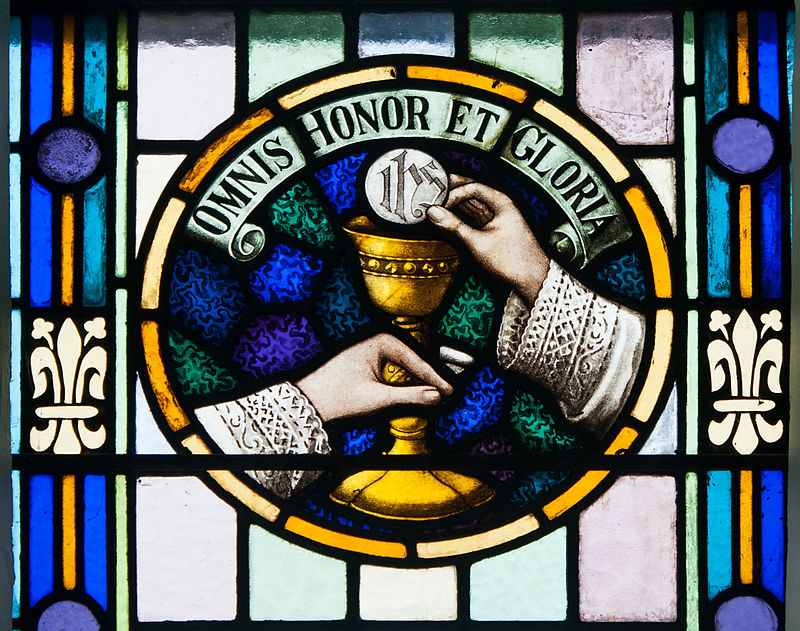The Patheos Catholic Channel is hosting a Symposium on the Family in light of the upcoming Extraordinary Synod on the Family in October and the recent release of the working document for the Synod.
One of the big-ticket issues on the table for the upcoming Synod for the Family is the idea of allowing communion for divorced-remarried couples. Eminent Catholic theologians, including most prominently Cardinal Walter Kasper, have argued in favor of this change. And so have I. But after dialogue with others and reflection and study and prayer, I changed my mind back to the traditional position. Now I hope the synod won’t change the rules–and indeed, I tend to believe it can’t. (We’ll see!)
My thinking at the time, roughly speaking, was that because the Eucharist is a spiritual medicine, it is precisely sinners who should receive it, because they are those who need it most.
This post is about how I came to change my mind.
Scripture and Tradition
The first, and unescapable, bit, is that this is a point on which Scripture and Tradition are actually quite clear. The Gospels are quite clear that remarrying after divorce from a (valid) marriage is adulterous. And in his epistles, Paul is quite clear about the importance of “discern[ing] the body”, i.e. the Eucharist. The entire pericope from 1 Corinthians 11 is quite clear that what Paul is warning against is receiving the Eucharist “unworthily”, and specifically with regard to the state of sin. Elsewhere in the same letter, Paul calls (1 Cor 5) for the excommunication of someone living in the state of sexual sin–for “the destruction of the flesh”, i.e. as a therapy so that this person may have a wake up call and come to repent. But until such repentance is at hand, Paul writes, this person must remain excluded from table fellowship.
And we know that the Tradition of the Catholic Church has always upheld these teachings. In the early centuries of the Church, excommunication “for the destruction of the flesh” was quite common–indeed, it was not uncommon for people living in a state of sin to be physically removed from churches, and for them to have to make public penance to be readmitted to table fellowship. Onwards and until very recently, communion was only infrequently received, typically only on high holy days, precisely because of the perceived importance of receiving “worthily.” The Church has always said that communion must, at least ideally, be paired with confession and received in a state of grace. What has now come to be called “closed communion” offends our Modern, inclusive sensibilities, but it is what Scripture and the Tradition of the Church mandate.
The Eucharist as Medicine
What, then, of the Eucharist as medicine? What I’ve grown to realize is that, precisely because the Eucharist is such “powerful medicine,” in Pope Francis’s words, we should not treat it willy-nilly. Paul (him again!) describes believers as falling sick and even dying after describing the Eucharist unworthily, and there is no reason to doubt him. Taking very powerful medicine against prescription is dangerous!
Here what has helped me deal with this in my own growth.
First is the idea that the Eucharist works as a “two-shot” medicine with confession. No, and I will always emphasize it, we should not treat the Eucharist as a reward for good behavior. But nothing in the properly-understood Christian life is in the order of carrots and sticks. Everything is in the order of holiness and growth closer to God. Much in the same way that encouraging women in the priesthood to combat clericalism is a sort of reverse-clericalism, putting no standards on the reception of communion is turning it into a reward for good behavior by lowering the standards of behavior. It is, quite literally, “cheap grace.”
Second is the importance of the idea of spiritual communion. By the doctrines of the priesthood of all believers, of lay participation in the liturgy, of Eucharistic Adoration, the life of the Church recognizes that we do have access to the Body of Christ, in a different but still powerful way, even without communing under the species. Rediscovering and reemphasizing spiritual communion should be an important part of this discussion, as Pope Benedict emphasized a number of times. (Some people have turned around this argument by saying: “If the divorced-remarried can receive spiritual communion, why not actual communion?” and I can’t find another answer but: LOL)
Third is a metaphor that Saint John of the Cross uses for the action of the Holy Spirit in our lives, which is the idea of the sun shining on a window. The sun always shines on the windows, but sometimes the window is dirty. If we want to have more light in the room, we have to clean the window. This is the powerful Catholic mystery of cooperation with grace. If we want the light, we have to clean the window. (Of course, cleaning the window is itself by the grace of the Spirit, which is why the co-working part is important–again, it is a mystery and no metaphor is perfect.) If you want to let the light in you have to clean the window.
The Call to Holiness and the problem of low expectations
This only leads up to the key thing that clicked for me, which is the centrality of the radical call to holiness which is at the heart of the Gospel and at the heart of the life of the Church at its best. The Church’s mission is to produce saints.
We have to get out of this legalism which says that Catholic life is to check all the right boxes and to abide by a series of don’ts and play the game by the rules and if you play the game right you get a reward at the end. The Catholic life–the Christian life–is, first and foremost, a radical call to holiness.
And you do not get holiness unless you expect holiness. We are called to be saints. We are called to be poor in spirit, not middle-class in spirit. The life of legalism is the life of the one who is middle-class in spirit: I’m not doing great, I’m doing ok, and sort-of cautiously playing my cards so I can get to the end of the game.
Of course, this always has to be balanced by mercy. This is the Gospel Thing and, I believe, the Catholic Thing. The message of Jesus is so confounding because he sets an impossibly high moral standard, and at the same time offers infinite forgiveness. What are we to make of that? We have to hold both ideas in tension, and I believe that (non-coincidentally) Catholic moral theology at its best does it. Jesus does not abolish the law, he fulfills the law. This means that even as there is always infinite mercy, there is also always high demands on us. The law is fulfilled in that the law is only through the Spirit, i.e. (a) being righteous under the law is about the heart as well as actions (e.g. committing adultery in your heart); (b) being righteous under the law is not about box-checking or don’ts, it is about fulfilling a positive vocation to holiness (e.g. a priest is not someone-who-doesn’t-have-sex, it’s someone who answers a particular calling and one of the implications of that calling is celibacy).
We are not called to be “good Christians”; we are called to be saints. And that means the Church must place demands on us. And for some of us, some of the time, those demands will be very hard. Christian life goes through the Cross. A Church of low expectations, a Church that says we might as well give people in (apparent) mortal sin communion because they can’t live a holy life is not the Church of Jesus Christ.
And here we get to the key point about this: the idea of repentance, or metanoia in the original Greek. Jesus demands repentance; in contemporary English, “repentance” has come to mean something like “feeling really sorry.” But the word metanoia refers to something much more profound, which is a radical change of life. If you want to follow Jesus Christ–if you want to be one with Him–, you have to undergo a radical change. What this means for each person will be different. But we must not paper over this radicality.
Jesus asks one man to give up all his money; he asks another to forego burying his father; he asks another to die. This is the Gospel. And the Church, if it is to be the Church, must ask metanoia of us. Mercy and grace are always, always there, but it is false mercy, and false grace, if it pretends that no metanoia is necessary. The Church must always accompany those who struggle with the call, and help them on the path to holiness. But the idea that union with Christ does not demand metanoia, which is what accepting communion for those who live in a state of sin is, is, I have come to believe, false.
Faith, obedience, and conscience
Thinking more deeply about these issues has been a spiritual journey for me and I want to reflect on that.
The first is the virtue of faith and obedience. I have been brought up all my life to question assumptions, and to question authority. I have an irrepressible need to quibble with everything, and to question everything, and to take things apart and see how they work and try to rebuild them better. I believe that is a very healthy impulse. But as I have grown on my spiritual journey, I have realized that this is also an impulse that needs to be checked by the virtue of humility. And in particular by the virtue of obedience. The word obedience gets a bad rap nowadays, but I think a better word for it is trust. There is a practical aspect to it: Catholicism is this very complicated beast, but you can be sure that whatever you’re thinking about, a lot of people who are a lot smarter and holier have been thinking about it better than you for longer. But it is also a spiritual thing. I often think of the Annunciation: Mary starts by questioning the angel, but then she gives her fiat, even though we can be sure not all her questions have been answered. This is very powerful: Mary is the perfect disciple; what the story of the Annunciation tells us isn’t just that it’s “okay” to ask questions, it’s that you must ask questions. Blind faith is no faith at all. But there is also no faith without the fiat, without the leap into the dark. Or think of Peter in John 6, after Jesus’ “hard teaching” on, precisely, the Eucharist: “You have the words of eternal life.” Here is someone, the text makes clear, who really doesn’t understand this teaching, and might even be repulsed by it as would most pious 1st century Jews would be, but still trusts Jesus; actually, Peter understands better than anyone; he is truly the Rock. Faith is a call to spiritual poverty, to accept to be a recipient, to accept to be like a child who trusts what her father says utterly. It is a letting go of pride, a letting go of everything that separates us from God. This probably sounds pretentious, and I want to make clear that I am absolutely not an example, but speaking for myself I don’t think it’s a coincidence that as I’ve grown in piety (such as it is), I have grown in orthodoxy; in the personal experience of my inner life, the connection is clear. It is certainly no coincidence that the vowed religious, who live the distilled Christian life, take triple vows of poverty, chastity and obedience. Money, sex, power: here are the gods who rule the World! Destroying those idols, with the help of the Holy Spirit, is the work of our lifetime, and must be renewed every day.
With all that being said, I want to make another point, which is related to conscience. I have been describing the issue of communion for divorced-remarried in rather black-and-white, and I think this is okay because the principle is important; but the world is not black or white. One of the key planks of Catholic moral theology is that everyone has an obligation to follow their conscience. This sounds like a license to do anything, but of course it’s not. We are always eager to trick ourselves into believing that following a base instinct or an easier road is “following the conscience” but it is following a false conscience. To truly follow one’s conscience requires all the virtues, particularly charity, faith, humility, prudence. It is hard work–a lot harder than box-checking legalism.
The point about conscience is important because of those “shades of grey” situations. I want to just mention a few. One of the things I hope the Synod will address is the broken annulments process in the Church. In many dioceses, annulments have become a farce, the proverbial “Catholic divorce.” But in many other dioceses, the backlog and bureaucratic lethargy is so great that it is for all practical purposes impossible to get an annulment even if the marriage is invalid. An annulment, by definition, doesn’t make a marriage invalid, it only declares it to have been invalid. For example, if there is a situation where someone is practically unable to get an annulment but believes in conscience–again, true conscience, not self-serving conscience–their marriage to have been invalid, that person may be able to go to communion if their conscience dictates. Another example is the state of necessity. In exceptional cases, someone may be in such spiritual distress that they feel–again, in true conscience, not self-serving conscience–that they need communion. Another example would be the case of spiritual direction; a spiritual director may in conscience feel that even though someone cannot yet give a full confession, they would be helped on their journey by communion. I also think of those who convert to Catholicism as adults after having divorced and remarried, and who, in the current state, may not be able to receive communion ever. The examples matter less than the overall idea: we are not, nor should we be legalists. Canon law is necessary, but it cannot possibly cover every possible case. And we always have a duty to follow true conscience. Not the entitlement of someone who wants their state of life to be validated or who approaches the law with no humility.
But even as we stress the importance of faith, humility and obedience, we should also stress–recognizing that when these things are properly understood there is no contradiction–the importance of following one’s conscience and rejecting legalism.
“Glenbeigh St. James’ Church Nave Triple Window Omnis Honor et Gloria 2012 09 09” by Andreas F. Borchert – Self-photographed. Licensed under CC-BY-SA-3.0-de via Wikimedia Commons.












